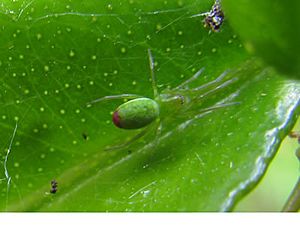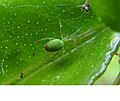Paradictyna facts for kids
Quick facts for kids Paradictyna |
|
|---|---|
 |
|
| P. rufoflava | |
| Scientific classification |
|
| Kingdom: | Animalia |
| Phylum: | Arthropoda |
| Subphylum: | Chelicerata |
| Class: | Arachnida |
| Order: | Araneae |
| Infraorder: | Araneomorphae |
| Family: | Dictynidae |
| Genus: | Paradictyna Forster, 1970 |
| Type species | |
| P. rufoflava (Chamberlain, 1946)
|
|
| Species | |
|
|
Paradictyna is a small group of spiders. These spiders belong to a genus, which is a scientific way to group very similar living things. There are only two known types, or species, of Paradictyna spiders. Both of them live in New Zealand, a country in the South Pacific.
Contents
About Paradictyna Spiders
Paradictyna spiders are part of the Dictynidae family. This family is known for making special kinds of webs. These spiders are also called cribellate spiders. This means they have a special silk-spinning organ called a cribellum.
What is a Cribellum?
A cribellum is like a special comb that some spiders have. It helps them make very fine, fluffy silk. This silk is not sticky like regular spider silk. Instead, it's fuzzy and acts like Velcro to trap insects.
Who Discovered Paradictyna?
The Paradictyna genus was first described in 1970. It was named by a scientist named Raymond Robert Forster. He was a famous arachnologist, someone who studies spiders and other creatures with eight legs.
The Two Species
As of May 2019, there are only two known species in the Paradictyna genus. Both of these species are found only in New Zealand.
- P. ilamia: This species was also described by Forster in 1970.
- P. rufoflava: This species was first identified in 1946.
These spiders are a small but interesting part of New Zealand's unique wildlife.
Images for kids
See also
 In Spanish: Paradictyna para niños
In Spanish: Paradictyna para niños
 | Kyle Baker |
 | Joseph Yoakum |
 | Laura Wheeler Waring |
 | Henry Ossawa Tanner |


